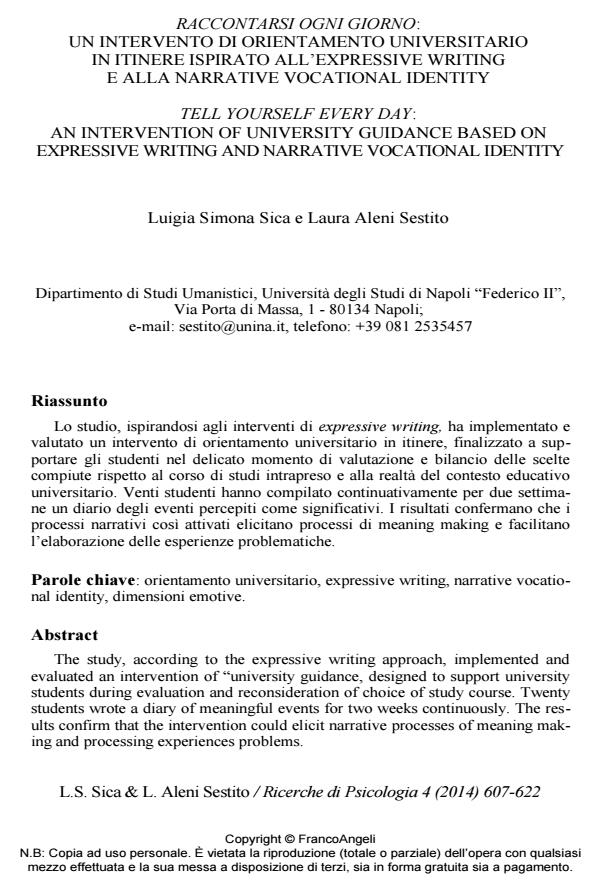Raccontarsi ogni giorno: un intervento di orientamento universitario in itinere ispirato all’expressive writing e alla narrative vocational identity
Titolo Rivista RICERCHE DI PSICOLOGIA
Autori/Curatori Luigia S. Sica, Laura Aleni Sestito
Anno di pubblicazione 2015 Fascicolo 2014/4
Lingua Italiano Numero pagine 16 P. 607-622 Dimensione file 227 KB
DOI 10.3280/RIP2014-004005
Il DOI è il codice a barre della proprietà intellettuale: per saperne di più
clicca qui
Qui sotto puoi vedere in anteprima la prima pagina di questo articolo.
Se questo articolo ti interessa, lo puoi acquistare (e scaricare in formato pdf) seguendo le facili indicazioni per acquistare il download credit. Acquista Download Credits per scaricare questo Articolo in formato PDF

FrancoAngeli è membro della Publishers International Linking Association, Inc (PILA), associazione indipendente e non profit per facilitare (attraverso i servizi tecnologici implementati da CrossRef.org) l’accesso degli studiosi ai contenuti digitali nelle pubblicazioni professionali e scientifiche.
Lo studio, ispirandosi agli interventi di expressive writing, ha implementato e valutato un intervento di orientamento universitario in itinere, finalizzato a supportare gli studenti nel delicato momento di valutazione e bilancio delle scelte compiute rispetto al corso di studi intrapreso e alla realtà del contesto educativo universitario. Venti studenti hanno compilato continuativamente per due settimane un diario degli eventi percepiti come significativi. I risultati confermano che i processi narrativi così attivati elicitano processi di meaning making e facilitano l’elaborazione delle esperienze problematiche.
Parole chiave:Orientamento universitario, expressive writing, narrative vocational identity, dimensioni emotive.
- Tra distress e agentività: il difficile percorso di consolidamento identitario nelle narrazioni di giovani adulti inoccupati o precari Simona Luigia Sica, Sestito Laura Aleni, in PSICOLOGIA DELLA SALUTE 1/2016 pp.111
DOI: 10.3280/PDS2016-001010 - Career development told through narrative research: exploring the stories of Italian and English young people Tiziana Di Palma, Hazel Reid, in International Journal for Educational and Vocational Guidance /2019 pp.129
DOI: 10.1007/s10775-018-9372-7
Luigia S. Sica, Laura Aleni Sestito, Raccontarsi ogni giorno: un intervento di orientamento universitario in itinere ispirato all’expressive writing e alla narrative vocational identity in "RICERCHE DI PSICOLOGIA " 4/2014, pp 607-622, DOI: 10.3280/RIP2014-004005